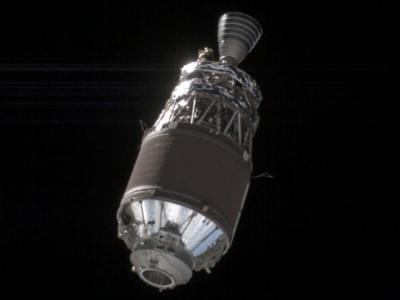Fri, Aug 09, 2024
Successful Mission Intercepts Space Junk for a Scouting Mission
Astroscale Japan Inc got some beautiful shots of orbital debris after the first successful flight of their Active Debris Removal by Astroscale-Japan (ADRAS-J) satellite.

Their unit made a flyby of a floating remainder of a Japanese upper stage rocket body, taking a series of pictures of the spinning junk as it circled the Earth. It's great news for space enthusiasts, since the space race and its new commercial age has tended to leave a good deal of material orphaned in orbit. That's quickly becoming a danger to satellite and space station options, eliminating orbital tracks from consideration in order to avoid high-speed impact damage. ADRAS-J's feat is the first time a satellite has demonstrated the ability to safely approach and operate close to large debris, the first step in a technical evolution that will one day rendezvous forcefully de-orbit such objects. Space cleanup is still in its infancy, but Astroscale's glossy jpegs certainly show that it's possible to at least complete step one in plucking trash out of orbit.

ADRAS-J's scouting mission showed that the piece in question retained its original payload attachment fitting, which is Astroscale's target for an ADRAS-J2 mission. That should allow the next satellite to close with the rocket stage, connect to it, and engage its thrusters to drag the whole bus-sized rocket to its atmospheric doom below. Getting in close and personal isn't easy, though, and making actual contact with the target will be much tougher than simply sitting and snapping pictures from afar. Objects in low Earth orbit generally speed along in the neighborhood of 15 to 20,000 miles an hour, adding considerable complexity in not just launching to intercept it from earth, but to snatch it in a secure enough position that will ensure the debris' structural integrity as it's pulled out of orbit. A poor connection could cause even more problems than it solves, since large debris could inadvertently break up into many smaller pieces with improper handling.
More News
Its Offerings Are Lighter, Cleaner, and Now Pushing Past 1,000nm on SAF Jet Fuel DeltaHawk’s diesel-powered aircraft lineup has seen incredible upgrades over the last few yea>[...]
The Airplane Experienced A Total Loss Of Engine Power On December 3, 2025, about 1600 central standard time, a Mooney Aircraft Corp. M20K, N57229, was substantially damaged when it>[...]
Make Sure You NEVER Miss A New Story From Aero-News Network Do you ever feel like you never see posts from a certain person or page on Facebook or Instagram? Here’s how you c>[...]
Aero Linx: European Society of Aerospace Medicine (ESAM) As a pan-European, independent forum, it works to promote the safety and health of all persons involved in aviation and spa>[...]
“We are excited to see Wisk achieve this milestone, and I’m so proud of the team that made it possible. The team at Wisk has built advanced technologies across flight c>[...]
 Aero-TV: DeltaHawks Diesel Power Steps Into the Spotlight
Aero-TV: DeltaHawks Diesel Power Steps Into the Spotlight NTSB Prelim: Mooney Aircraft Corp. M20K
NTSB Prelim: Mooney Aircraft Corp. M20K ANN FAQ: Turn On Post Notifications
ANN FAQ: Turn On Post Notifications ANN's Daily Aero-Linx (12.20.25)
ANN's Daily Aero-Linx (12.20.25) Aero-News: Quote of the Day (12.20.25)
Aero-News: Quote of the Day (12.20.25)




